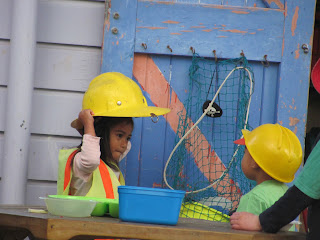June 2013
"In
play a child is always above his average age, above his daily behaviour; in
play it is as though he were a head taller than himself…in play it is as though
the child were trying to jump above the level of his normal behaviour." (Vygotsky, 2002).
At Petone Kindergarten, our new focus is on
‘Dramatic Role Play’ we have chosen this because we noticed a lot of dressing
up and pretend play happening around the place. This is not anything new but we
can see it happening in just about every context area – Playdough, blocks,
dancing, sandpit, literacy and outdoor play to name a few. Also, it seems to be more prevalent than
normal at the moment. There are many
names for this dramatic play: imaginative play, make believe, fantasy play and
socio-dramatic play.
Sociodramatic
play is recognised as the highest level of dramatic play, (Christie, 1982)
because it requires the combination of social and dramatic play skills.
It requires creation of imaginary common sense
field
Smilansky
(1968) described six elements of play which must be
present in order for play to be considered sociodramatic:
·
Imaginative role play
·
Make-believe with objects
·
Make-believe with actions and situations
·
Interaction
·
Verbal communication
·
Persistence
There are people who underestimate the value and
incredible richness of children’s play, but we want to dispel this myth and let
you know the amazing learning that goes on whilst children play. First, let’s
think about why children play. Donaldson (1978) would say it was: “To make sense of and derive meaning from the
contexts of their lives”
Children are naturally curious and have this
amazing sense of wonder for the world around them. They desperately want to
find out and make sense of the world. Playing
is a big part of how they do this.
Play is a fundamental human activity (it occurs
across life span as well as across cultures)
Play is an expression of the child/s developing
personality, sense of self, intellect, social capacity and physicality.
Play is essential for optimal development and
learning in young children.
Why do children play?
To make sense of and derive meaning from the
contexts of their lives (Donaldson, 1978)
To keep control of their lives at least of that part which is their play (Garvey, 1977).
Play is the leading source of development in
preschool years (Vygotsky, 2001).
What are the main functions of play activity?
·
Thinking
·
Imagination
·
Intention
·
Generalised emotions
Evolving memory 'gives birth' for imagination
Imagination is the new formation that is not
present in the consciousness of the very young child, (Vygotsky 2002).
Imagination manifests itself through play
activity
Imagination is usually creating a picture of
something in our heads and holding it there while we think about it, (Hughes,
1998).
Absolutely everything that was created by the hand
of man is the product of human imagination and of creation based on the
imagination (Vygotsky, 2002).
Construct Mode
Instead of here/now or there/then, the mind begins to concern itself with somewhere/sometime or anywhere/anytime, (Donaldson, 1992).
Instead of here/now or there/then, the mind begins to concern itself with somewhere/sometime or anywhere/anytime, (Donaldson, 1992).
Iljenkov (1977) underlined that social play with
peers enables children to overcome their egocentrism. Only through a situation
of controversy, hot discussion or most
often a conflict children are able to accept others point of view.
The child moves forward essentially through play
activity, Vygotsky 2002
Vygotsky (2002) Play is converted to internal
processes at school age, going over to:
- Internal
speech
- Logical
memory
- Abstract
though
- Rule
based activities such as learning tasks and work
All forms of human activities spring out from play
activity
All the research has backed up our ideas and
thoughts about children’s play here at Petone Kindergarten. We hope to educate
parents about the importance of play through the blog. Let us know what you
think….post your comments here.
























